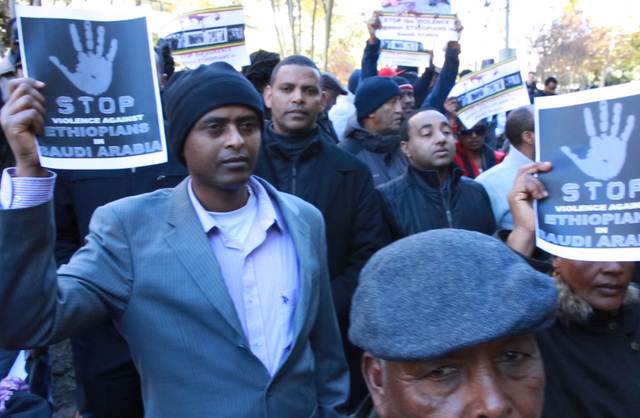 Ethiopians protest outside Embassy of Saudi Arabia in Washington, D.C., November 14th, 2013. (Tadias)
Ethiopians protest outside Embassy of Saudi Arabia in Washington, D.C., November 14th, 2013. (Tadias)
Tadias Magazine
By Tadias Staff
Published: Sunday, November 17th, 2013
New York (TADIAS) — “Migrants who overstay their visas still have human rights,” says Rima Kalush, a member of www.migrant-rights.org, a Bahrain-based advocacy group established in 2007 to document abuse as well as to engage both Gulf citizens and migrants in a dialogue on the spectrum of their issues. “We also try to connect migrant workers in distress to individuals and organizations on the ground,” Rima stated in a recent interview with Tadias Magazine regarding the recent violence in Saudi Arabia and what could be done to bring about a lasting solution to this long-festering crisis.
“The amnesty period does not justify the current crackdown on migrants, Rima added. “Undocumented migrants still have rights, including the right to contest their status on a case-by-case basis with access to a lawyer and translator.”
The random raids, Rima noted, are psychologically harmful, and expose even legal migrants to unnecessary physical danger and trauma. “The Saudi government has not fulfilled its promise to respect the rights of workers during the implementation of the Nitaqat,” She said. “Origin countries, such as Ethiopia, must also provide migrants with the means to contest their cases as well as the means for quick processing of documents and repatriation.” Rima pointed out that ultimately the big elephant in the room in this case is the legal responsibility of their home government.
“Domestic workers can be trafficked in different ways; some are trafficked in the sense that they are misled about the conditions of their employment, and then are unable to leave exploitative working conditions,” Rima said. “Others can be trafficked once they are in the country, sometimes by recruiting agents themselves.”
According to the U.N., there are over 600,000 forced laborers throughout the Middle East. “Unfortunately, this form of trafficking is not often recognized by GCC governments, who prefer to focus on sex trafficking,” Rima said. “They also face very limited access to legal recourse. Firstly, it can be physically difficult for domestic workers to obtain legal representation; they often would have to first escape their place of employment, enter into an irregular status, find refuge in an embassy shelter (which can be very far from their place of residence).”
Rima emphasized that engaging in the dialogue about migrant rights on the ground is critical. “It is often non-migrants at home who advocate for and secure rights for these abroad citizens,” she said.
Migrants in general, particularly domestic workers, also have difficulty securing financial support for lawyers and translators. “If they do overcome these obstacles, they generally face an unsympathetic court system,” she said. “They are often required to remain in the country throughout the trial, which can be prolonged for years. During this time it can be very difficult for them to find work, and they have to obtain official permission to do so. This means that domestic workers, who are often psychologically traumatized, often elect to return home instead — with none of the wages or compensation owed to them.”
In instances in which the court rules in favor of the domestic worker, enforcement of the ruling is often weak. “In many cases, particularly when the employee faces jail time in addition to a fine, the sentence is reduced,” Rima noted. “The virtual absence of penalization means employers are essentially empowered to treat domestic workers as they wish. Though many employers do treat domestic workers well, there are simply too few protections against those who do not.”
Asked about the challenges and rewards of advocating for migrant labor rights in the Middle East, Rima highlighted that government policies are very difficult to change. “It means that our efforts are primarily directed at changing social attitudes towards migrants,” she said. “Over the past few years, we have seen in op-eds and other articles the start of a real shift in popular conceptions of migrant laborers and domestic workers.”
She noted that another challenge they face is the digital divide. “A lot of migrant workers don’t have access to the Internet, and consequently to us, to amplify their voices. However, many will work through family members in origin countries who then contact us or use social media to elevate their stories.”
What’s her view on the tens of thousands of Ethiopians that at the moment are stuck in Saudi Arabia? “They must be allowed the opportunity to contest their status, if they are detained they must be provided with humane conditions, and they must be provided with access to lawyers and translators,” she said. “They are also entitled to speedy repatriation and the opportunity to collect potential unpaid wages from employers.”
Rima said they are currently working on a campaign to formalize rights for domestic workers, to ensure adequate heat protection for laborers and to end medical discrimination against migrants.
“We are also always looking for contributions in the form of opinion pieces or experiences, which critically shape narratives of migrant and human rights discourses,” Rima said. That is one way we can all get involved to start bringing about social change.
—
You can learn more about the organization at www.migrant-rights.org.
Related:
NYC Ethiopians Make Presence Felt at the Saudi Mission to the United Nations (TADIAS)
Ethiopians demonstrate outside Saudi embassy in London (BBC News)
The Ethiopian Migrant Crisis in Saudi Arabia: Taking Accountability (Tadias Editorial)
Ethiopians Continue Peaceful Protests Against Migrant Abuse in Saudi Arabia (TADIAS)
Photos: Ethiopians Hold Protest Outside Saudi Embassy in Washington, D.C. (TADIAS)
Ethiopians: #SomeoneTellSaudiArabia to Stop Crackdown (Global Voices)
First group of Ethiopians from Saudi arrive in Addis (ERTA)
23,000 Ethiopians ‘Surrender’ in Saudi After Clamp Down (BBC)
Three Ethiopians Killed in Saudi Arabia Visa Crackdown (AFP)
Ethiopians Returning From Saudi Arabia Describe Horrible Attacks http://t.co/EFWepkLsct
— Tadias Magazine (@TadiasNews) November 17, 2013
Join the conversation on Twitter and Facebook.

























